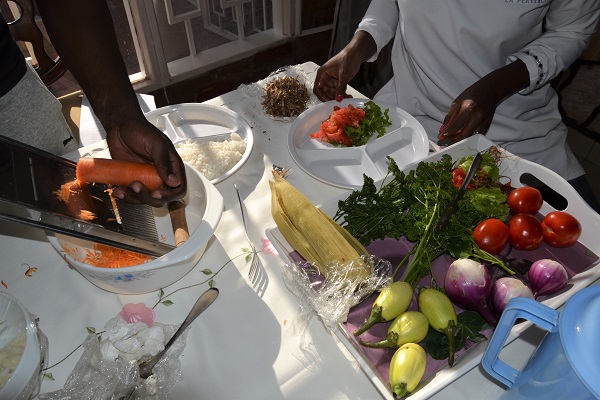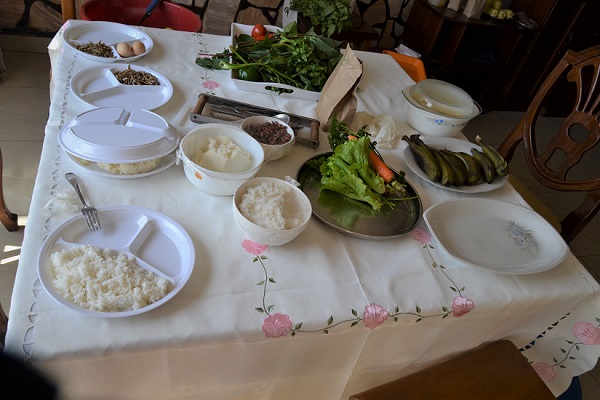
By Steven Nsamaza;
Kigali: While Rwanda has met many of its development goals, stunting (low height-for-age) still affects as many as 37.9% of its children under five years. Stunting is the impaired growth and development that children experience as a result of malnutrition, repeated infection, and inadequate psychosocial stimulation.
Stunting in early life – particularly in the first 1,000 days from conception until the age of two – has adverse functional consequences including poor cognition and educational performance, low adult wages, lost productivity and an increased risk of nutrition-related chronic diseases in adult life. This not only impacts families’ lives but also has far-reaching consequences for economic productivity and national development.
Today, malnutrition has been exacerbated by the outbreak of the disastrous Corona virus (COVID-19 pandemic) which is affecting the world’s economies with far reaching consequences mostly to vulnerable communities. The pandemic has led to restrictions on movements within cities and between regions, stopping all other economic activities except for food, medicine and sanitary essentials. During this period, everyone strives to secure his/her life as everyone scrambles for protective devices and food for survival.
During such situations or crisis, the choice of food becomes a challenge and particularly not catering for breast-feeding and pregnant mothers as well as children less than 5 years.
To be part of the solution to these challenges during such tough times, RDO has devised means on educating Rwandans on how to use the most available and affordable foods and demonstrate to them how one can prepare well balanced diet with the available food stuffs that can be afforded by the majority of Rwandans.
Previously, RDO has supported community cookery clubs locally known as ‘Igikoni cy’umudugudu’ that talks about nutrition, sourcing affordable & good quality ingredients along with demonstrations and most importantly feeding children together. Unfortunately due to the Coronavirus pandemic those can’t operate now.
It is equally important to advise citizens on feeding patterns during the lockdown to meet the body nutrient requirements among pregnant women, breast feeding mothers and young children to avert stunting in the future.
This doesn’t apply to only the poor but everyone including the rich as many may not be sure how to balance the diet instead mind about the quantity of food to last them a certain period. As you may or should know, to build our bodies so they can resist diseases like COVID-19 we require strong immune system which is a result of proper feeding, resting enough and regular exercising.
Nutrition

As feeding is one of the things we do regularly thus good food should be a priority as it is the basis of an excellent health. The body needs ‘good food’ for proper functioning, to gain the energy to carry on its daily tasks. Many people think to prepare a good meal is expensive and hard to maintain, however, you can actually keep your meals healthy with very common and affordable food stuffs.
So what is the ‘good food’ with its different types that our body needs?
Anastasie Mukakayumba, a nutritionist and Founder of La Prevenche Ltd, a nutrition cabinet that provide professional advice about diet says all available food found in our neighborhoods or markets should be good if not compromised with the common mistakes most people do.
Mukakayumba takes us through the exercise of preparing nutritious meals saying that proper feeding is having a balanced diet with different foods rich in nutrients that our bodies require both in quantity and quality. There are foods that; build our bodies, those that provide strength and others that guard against diseases. The food should cater for our bodies based on the kind of work we do, age levels and some rare circumstances that our bodies may experience like pregnancy, breast feeding or sickness.
Good food can are those that contain vitamins and minerals, they can be nutrient-rich vegetables, fruits, whole grains, dairy, and a source of proteins.
Proper feeding doesn’t only look at the final meal on the plate but starts on the farm, at the market where we buy food stuffs, how we store, how to prepare, on the table and finally what to consume, as much as food is very fundamental to a health body it can also be harmful if consumed inappropriately.
Poor feeding can always lead to adverse effects when we are malnourished or consume more than our bodies require. This can result in stunting that slows body and/or brain growth in children and lead to nutrition-related chronic diseases in adult life. While consuming more than our body needs and unbalanced diets may lead to diseases like obesity, diabetes, high blood pressure, etcetera.
Therefore, RDO in collaboration with La Prevenche Ltd have prepared a guidance in preparing nutritious affordable foods demonstrating that;
- Even during food crisis, people can still eat nutritive and affordable foods irrespective of their economic status.
- Through cooking the kinds of food that constitute balanced diet, families can alternate meals and advise what to buy from markets or supermarkets.
- Proper cooking using available ingredients and mistakes that most families do while preparing food.
- People can learn through the demo effects of stunting and how it can be improved at household level and the type of food stuff that pregnant and lactating mothers as well as children under five can consume.
Common mistakes towards harmful food stuffs
Many people make mistakes while buying food at the market or supermarket unknowingly that it can be harmful to their health. While buying food, we should be careful what we buy to avoid some common mistakes.
Some people buy low grade commodities that look to be cheaper yet are depleted of nutrients and may inhabit microbes that are harmful. Among these are low standard foods that are picked out from quality ones, food stuffs that are starting to get spoilt, flours with aflatoxin. These may have lost nutrients while others have elements that can cause diseases like cancer, hepatitis, etc.
Over consumption of food stuffs from factories with too much oil, sugars and preservatives like margarine, cheese, sausages, pizza and others are harmful. Such food can increase unnecessary fats that can hinder blood circulation which can lead to diseases.
Cooking to much food to be stored in the refrigerator to remove little by little depletes its nutrients as well as tinned food that is often mixed with other unnecessary elements like conservatives. Most nutrients are depleted when food is kept inappropriately over a longer period while for fruits and vegetables when they spend some time after harvesting them also lose their nourishment.
Packaging is also an important factor, where some people use unsafe containers like putting oils in plastics or packing food in envelopes made from used papers may contribute in causing diseases like cancer because of the ink.
Therefore, the way we pack and keep our food is very important but there are some common mistakes in the way some do it. Preserving meat and fish with smoking or salt can as well contribute to cancer while keeping cereals in too much cold is not good. Fruits and vegetables are also not advised to be stored in warm temperatures.
Storing Food
Maintaining proper temperature during storage of food is very important and storage time should be checked. Food to be stored in refrigerator shouldn’t exceed a specified time for example Dairy products like milk, crème, yogurt– 5 days, Cauliflower – 6 days, Pepper – 7 days, Celery & cabbages – 2 weeks, Tomatoes, Onions, Cucumber & Zucchini – 7 days, Beans, Mushrooms, and Broccoli– 5 days.
Sometimes we are required to store food for longer and to achieve this we use the freezer which can keep Fruits: 10-12 months, Vegetable: 8-10 months, Fish: 3 months, Bread: 1 – 2 months. But some foods are not supposed to be stored in freezer like Eggs, Dairy products, Salads, Posho and Irish potatoes.
Preparing Food
When preparing food, make sure that the food is not exposed to the temperature danger zone for too long and in a serene environment. There are also some common mistakes in preparing and consuming food.
Vegetables should not be cleaned after cutting rather before as they may lose nutrients in the process and shouldn’t be overcooked for more than 20 minutes. Pealing should be done cautiously for instance potatoes.
Warming food of different kinds is not advisable like rice, potatoes, chicken, mushroom soup, spinach, eggs, lettuce, pizza, chips, celery, pepper and maize. Cooking in the sun or open spaces depletes vitamins A, B & C and warming with microwave is also not advisable.
Nutritionists also advise that preparing many kinds of food for a single meal which may be excessive can also cause overweight which is a basis for different diseases.
Healthier feeding
Finally, when you have prepared a health meal, how you eat is as well very important and this should be one of the happier moments of the family to enjoy. During this time any distractions must be avoided like telephone, television which may interdict the smooth digestion process.
While on table it is also recommended to eat your meals first and avoid mixing with water, while water comes with a bevy of health benefits, it shouldn’t be had during or immediately after meals because it can hamper your digestion process, spiking insulin levels. Mukakayumba recommends a 30 minute window both before and after your meals adding that you shouldn’t either sleep or exercise immediately after the meal.
Discipline while taking your meals is equally important, rapidly chewing or frequent eating may not be ideal as well as having too hot or cold meals and drinks. Tasty meals shouldn’t be rushed rather enjoyed and having fruits immediately after the meal is also not recommended but should be taken at least an hour before or after your meal.
